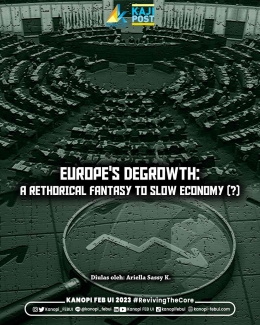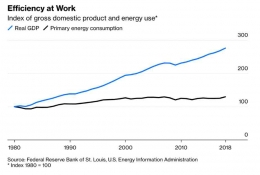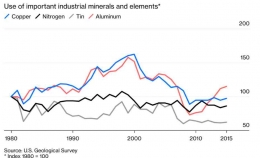Just in late May 2023, the European Parliament conducted the "Beyond Growth" conference. The EU The Beyond Growth 2023 Conference is a multi-stakeholder event aiming to discuss and co-create policies for sustainable prosperity in Europe. When it was first held in 2018, the idea of degrowth in Europe's policies faced a lot of backlashes, as stated by Philippe Lamberts, a Green MEP behind Beyond Growth. But what is interesting from the outcome of this, is that Europe's parliament has a strong preference towards degrowth in the economy. The trajectory of the concept from facing many backlashes for the "controversial" nature of going against the status quo in measuring the economy, to being a considerable option to put in Europe's economic policies is a topic worth dissecting.
On the origin of Degrowth
Degrowth was used for the first time within the context of production growth by the French Intellectual Andr Gorz in 1972. 'Dcroissance' (French for degrowth) in his context was to answer a question that's still the center of the debate itself:
'Is the earth's balance, for which no growth -- or even degrowth - of material production is a necessary condition, compatible with the survival of the capitalist system?'.
The spectrum on which degrowth can be defined varies. There's a point where it only ends in criticizing the use of GDP as the main measure of a society's success, the "post-growth" advocates beliefs in equal satisfaction regardless of economic fluctuations--moving away from constantly increasing output, and the de-growers, who constitute the majority at the conference, actively seek to intentionally reduce the size of the economic pie. They argue that growth harms the planet and primarily benefits the wealthy.
To measure the overall state of the economy, Gross domestic product (GDP) has evolved since the 20th century as the single most important economic indicator was institutionalized in the United Nations (UN) System of National Accounts in the post-war 1950s, enabling cross-country comparisons. As the industrial revolution started to maneuver the huge increase in production, it was indicated that the rising living standards, and life expectancy in the 20th century is also due to the significant periods of economic growth ever since.
But GDP as a measurement for the overall economy is often criticized as it doesn't consider where the increased production comes from (i.e. responding to wars or natural disasters) and how it ignores wealth distribution and the depletion of environmental common goods. While it does not always necessarily mean negative GDP growth, GDP reduction as currently counted for its early adaption, is one of the early steps to be promoted within its concept.
One of the more prominent suggestions goes as far as to say that wealthy economies should abandon GDP growth as a goal in the first place, and scale down destructive and unnecessary forms of production in order to reduce the use of energy and materials. The idea to change the objective of economic activity to securing human well-being has come to the attention which can enable rapid decarbonization and stop ecological breakdown while also improving social outcomes. With the end of the oil crisis and the rise of neoliberal economic policies in the 1980s through the 1990s, the interest to limit growth and degrowth-- grew.
In Policies and Rhetorics
One of the reasons degrowth is also still in opt is because of the low altitude level of decoupling expectation. Decoupling, which broadly means the divergence between carbon emissions and economic growth, is being considered in a somewhat pessimistic view where the European Parliamentary Research Service, Beyond Growth's document stated that absolute decoupling of global resource use and greenhouse gas (GHG) emissions from economic growth has not yet taken place and appears to be unlikely, if not outright impossible, to achieve in the future. Going as far as to consider that "sustainable growth" might be an oxymoron.










